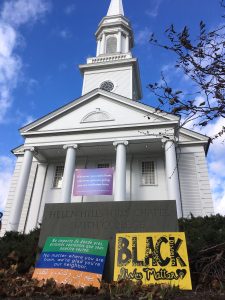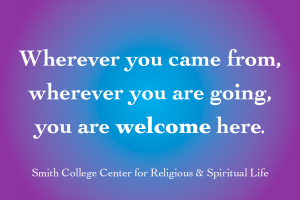In these times of discrimination against immigrants, people of color, those seeking refuge, and so many other groups, in addition to a rash of gun violence and natural disasters which have displaced and traumatized whole communities this fall, it is of deep and urgent importance that we embody welcome. As the articles in our newsletter this month highlight, welcoming the stranger is a trope shared across religious traditions; it is indeed a cornerstone of how we are called to enact human rights, and welcome is our theme at the Center for Religious and Spiritual Life for 2017-2018.
 What does it mean to welcome someone, and who is it that should do the welcoming? These are not easy questions, nor are they things we think we have figured out here at the CRSL. But embedded in our mission is the mandate to try to be welcoming, creating an environment as free of judgment and discrimination and divisiveness as possible.
What does it mean to welcome someone, and who is it that should do the welcoming? These are not easy questions, nor are they things we think we have figured out here at the CRSL. But embedded in our mission is the mandate to try to be welcoming, creating an environment as free of judgment and discrimination and divisiveness as possible.
Some of the simplest ways we do this are remaining committed to our hospitality practices; offering homemade vegetarian food in our Friday Soup, Salad & Soul program, our Mindful Monday program, our bimonthly Jummah Prayer Lunch, or our bimonthly Interfaith Lunch. We offer these meals as nourishment for body and spirit. We use our sanctuary as a place for “diverse expression of the human condition,” wherein our sacred space is a venue for performances and readings which give voice to the search for meaning suffering, joy, love, and struggle.
But hospitality in itself is not enough to convey true welcome. And we are more than a building, though we, an interfaith center, are housed in the Helen Hills Hills Chapel, which was built by the college in 1957. We are the Center for Religious and Spiritual Life, and thus our welcome needs to extend beyond the walls of the building to our programming that may take place elsewhere on campus or beyond.
In my denomination, the United Church of Christ, we have what we call a “radical welcome.” Sunday worship services begin with the call “whoever you are, wherever you are on life’s journey, you are welcome here.” But then there is also a specific welcome to “questioning believers, those struggling with faith, those who struggle with mental illness, those of all sexual orientations, abilities, gender identities, skin colors, and racial and ethnic heritage.” These categories of identity are named, week after week, in an opening welcome. Those most likely to not feel welcome are invited in in particular.
A radical welcome is an intentional welcome. This is where the values of welcome in the religious traditions and social justice are inextricable. We name and extend our welcome especially to those who might not feel at ease or at home or even safe in so many other sectors of society. We strive to be explicit about our welcome, naming and highlighting that we are an open and affirming space, affirming of all identities and belief systems. And when it comes to conflict, we are committed to dialogue, always with an ear to justice and what Jewish theologian Martin Buber called an “I-thou encounter” in which each party is truly seen and taken in. Martin Buber says all authentic relating with other humans takes us into relationship with God.
A few of the small ways we practice our welcome is through doing our best to be a spiritual sanctuary where dialogue, mutual space, and contemplative practice are honored. We strive to have discussions wherein there is balance of which voices are being heard, and authenticity is sought by all parties. We participate in the Smith College Refugee Consortium, a group convened to work with the wider community refugee resettlement in Western Massachusetts, and we partner with the student group OUSR,Organizing for Undocumented Students’ Rights.
Most importantly, we want students and community members to feel so that we can be an entity that helps us all welcome each other. Often we need to feel at home, seen and recognized, ourselves in order to open the home in our hearts to those around us. We mean what it says on the banner that hangs on the front of our building:

